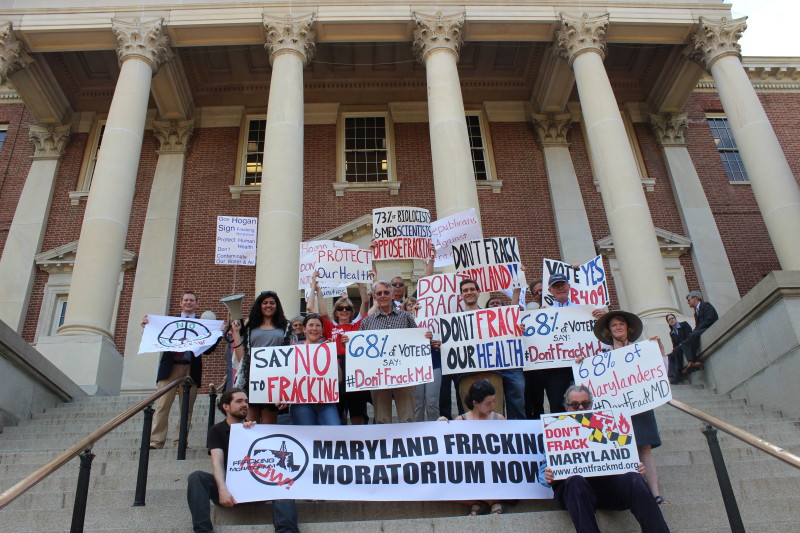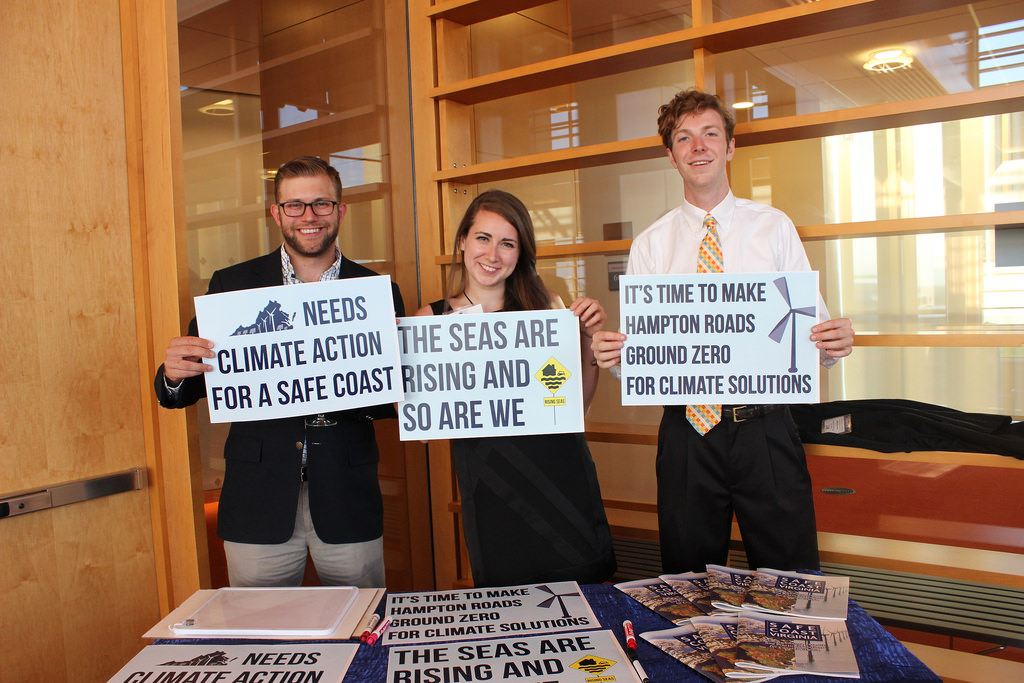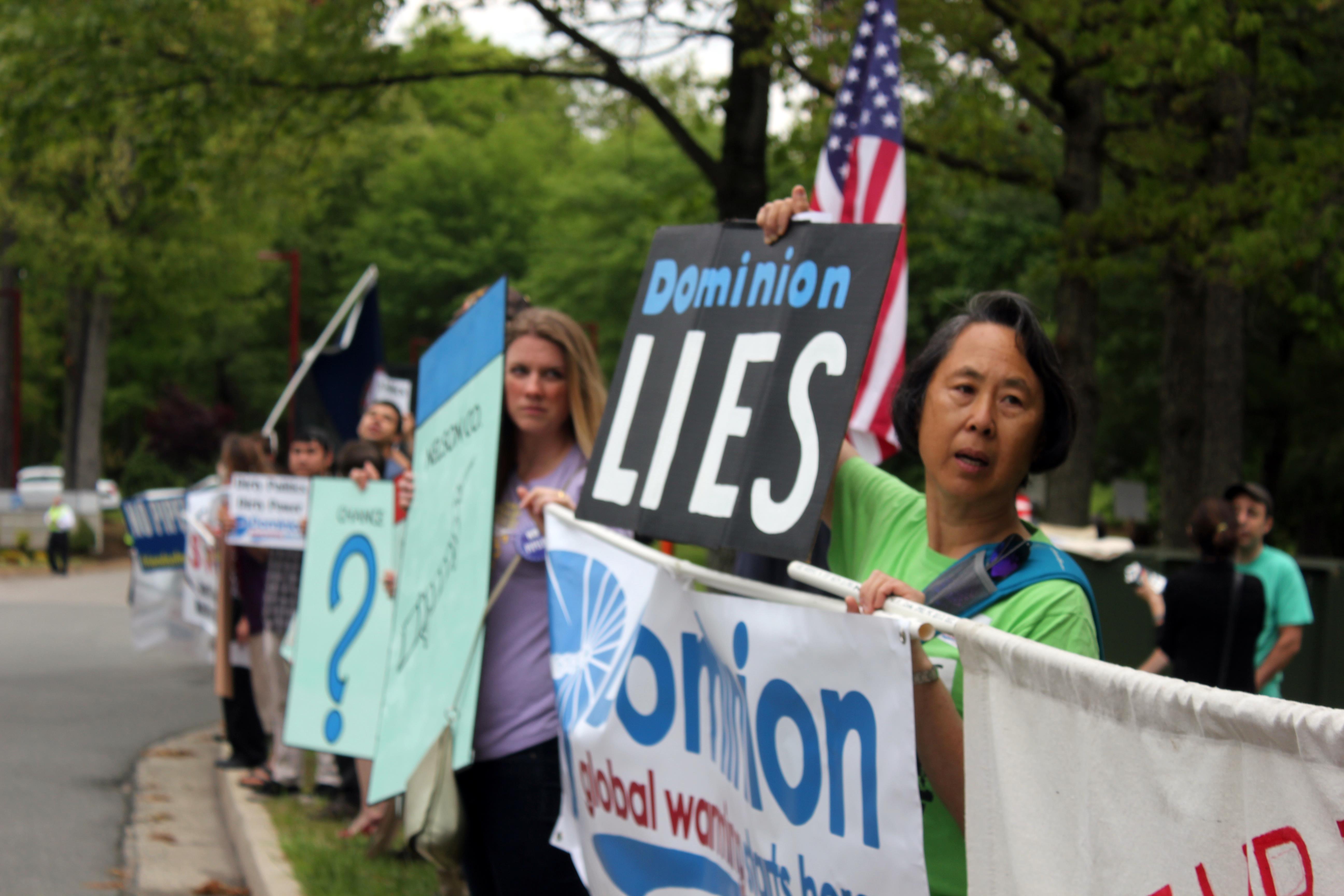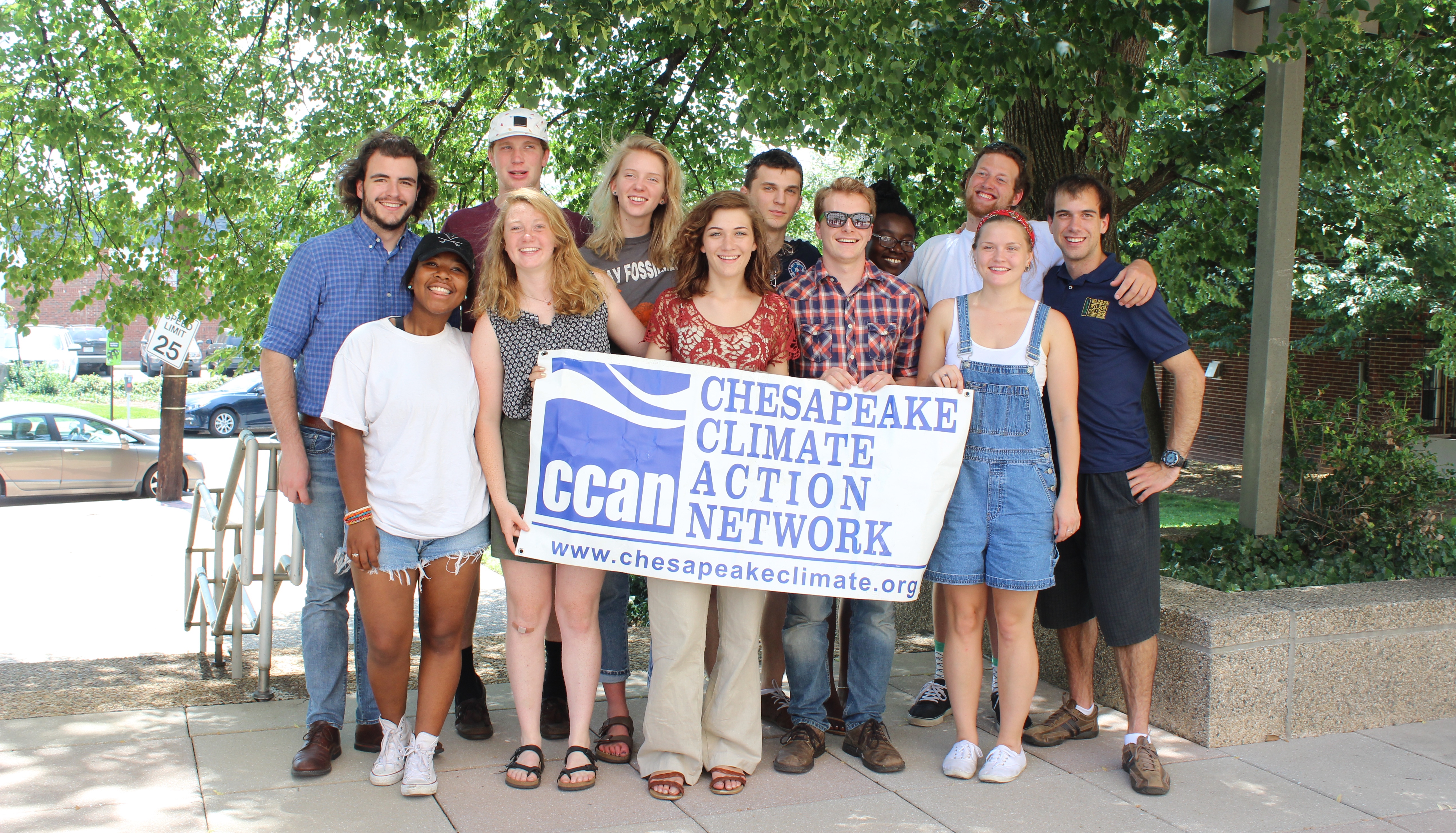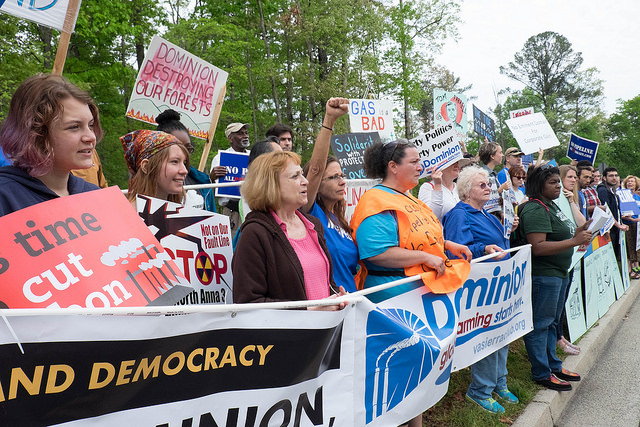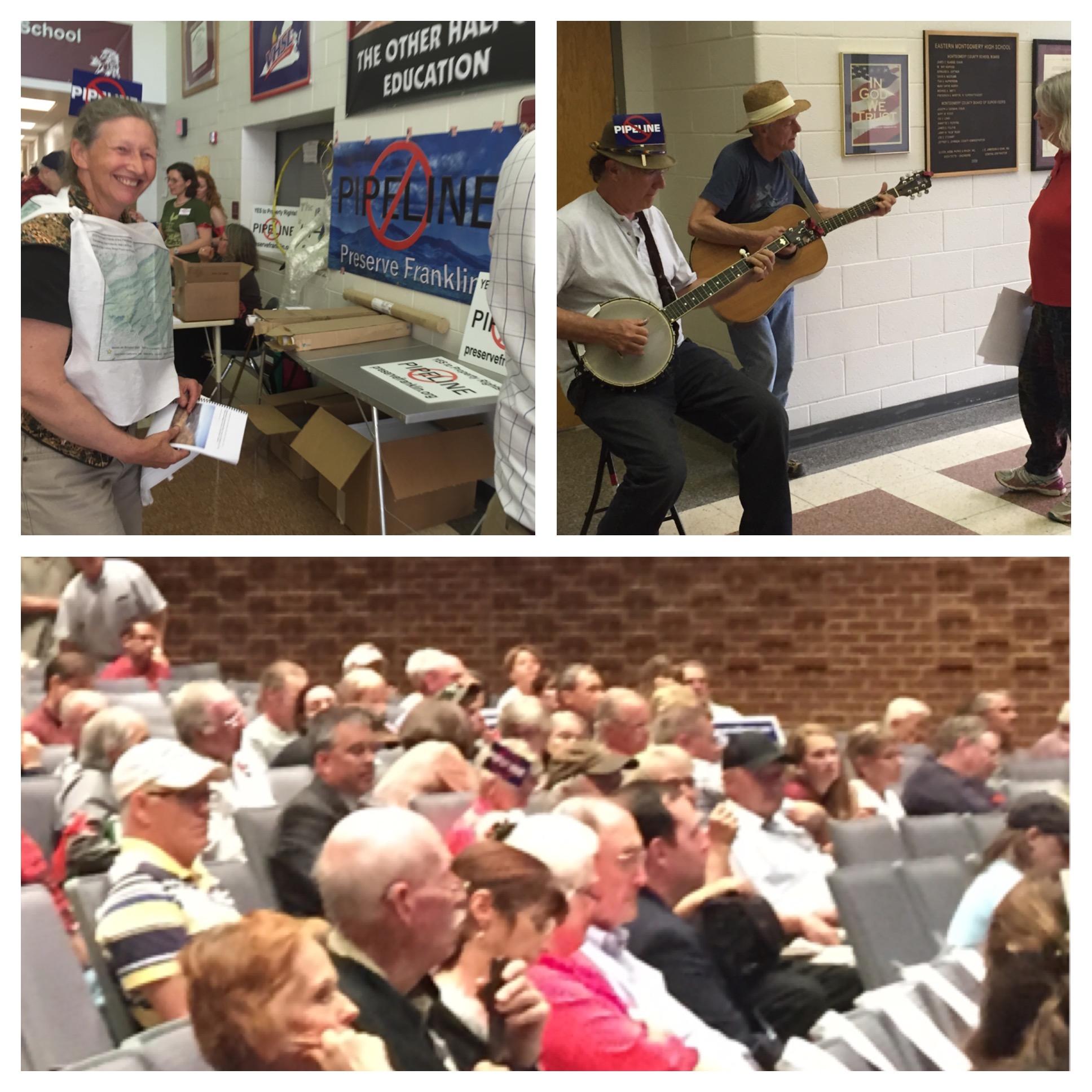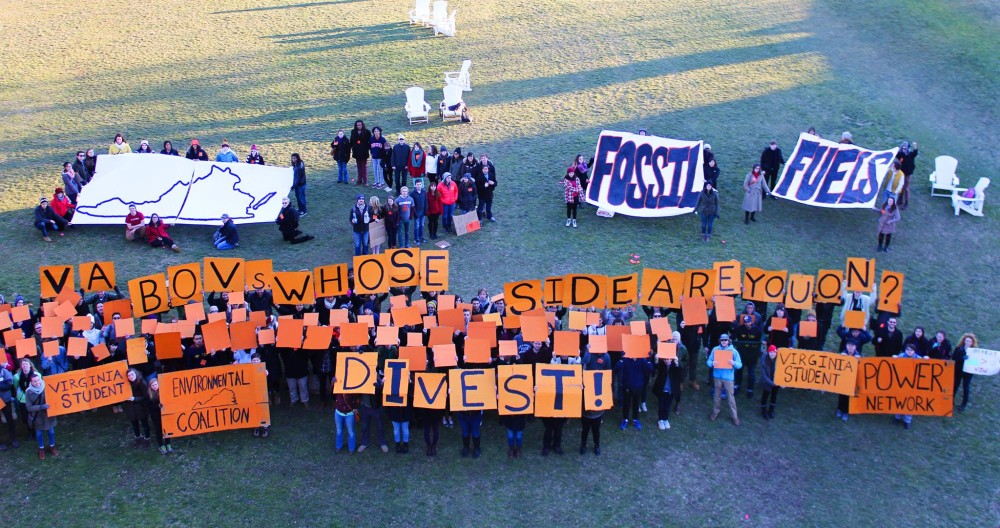Dear CCANers,
“All is not lost. Human beings, while capable of the worst, are also capable of rising above themselves, choosing again what is good, and making a new start.”
These are the words of Pope Francis, issued June 18th as part of his historic “encyclical” on climate change and the environment. Encyclicals are Papal letters to the clergy and laity of the church that are considered highly authoritative. In this 184-page document, Francis spells out the urgency of the climate crisis, describes the spiritual and economic failures underpinning the crisis, and – most importantly – emphasizes the need for immediate and sustained ACTION from our leaders and from grassroots citizens worldwide like you and me.
Action. It’s the only way we can “rise above” the moral obscenity of profligate fossil fuel use and make a “new start” with clean wind and solar power. All too often we see people move from outright denial over climate change to outright paralyzing despair when the denial finally ends, without pausing in between on action, on actually doing something about the crisis. And now the most-recognized moral leader in the world – Pope Francis – has called on all the people of the world, not just Catholics, to see and repair the scourge of climate change.
Most moving to me as I read through the encyclical – titled “Laudato Si’,” or “Praise Be to You” – was the emphasis throughout on the appalling and unfair impacts global warming will bring to the world’s poor, who are least to blame for the problem. As a Christian myself – Presbyterian – and as a former Peace Corps Volunteer in the Congo, this issue hits home for me. In the tiny African village where I lived in the 1980s, it wasn’t a question of dirty coal-fired electricity versus clean wind power. These villagers had NO electricity whatsoever. And still don’t. And no cars. And virtually no carbon-intensive meat consumption. Yet the poorest villages worldwide are being walloped – as we speak – by the floods and droughts and extreme weather they cannot adapt to. It’s totally unfair.
Thankfully, there are lots of actions we can take right now here in Maryland, Virginia and DC to right this wrong. The Pope will be bringing his message directly to DC in September with an address to Congress and a Mass at Catholic University. As an act of solidarity with the Pope, won’t you join me and thousands of others for a “Moral March” on Sunday, September 20th? It’s being organized by our friends at the group “Moral Action On Climate.” It’s going to be big and it’s going to be spirited. And – especially if you are Catholic or religious – please make plans to attend a prayer vigil on the capitol grounds on the week of September 20th, more details will be sent out soon. Learn more about local Catholic leaders putting the Pope’s call into action by visiting this great resource page from our friends at Interfaith Power and Light.
Of course there’s also plenty to do beyond the Pope’s visit. CCAN, since its founding 13 years ago, has proudly included the word “action” in our very name. So get ready for a busy summer and fall taking action across the region: phone banking, door knocking, emailing, and marching for clean energy right here where we live. We’ll be working to pass a statewide carbon cap in Virginia, implementing a carbon tax in DC, and dramatically expanding wind and solar power development in Maryland.
As a people, we are indeed capable of rising above ourselves and choosing again what is good. The Pope just gave the world a big reminder of the core truth. And CCAN is here to help give you a way to make it happen every day.
Power to the people!

Mike Tidwell
Maryland's two-year FRACKING MORATORIUM: A GRASSROOTS VICTORY, A GRASSROOTS OPPORTUNITY
On Friday, May 29, a two and half year moratorium on the practice known as hydraulic fracturing, or fracking, became law in the state of Maryland – making Maryland the first state with significant gas reserves to put a legislative moratorium on fracking (under a pro-fracking Governor no less).
This victory was inspiring not just because of what it means for staving off the impacts of drilling to Marylanders’ health, air and water, and not just because of what it means for keeping two years’ worth of harmful greenhouse gas emissions from fracking out of our atmosphere. It was inspiring because of HOW it was won: this was a true grassroots victory.
Marylanders from the mountains to the shore have fought for years to protect our air, water, economy, and climate from the gas industry, and this year was no  different: the grassroots movement behind this two and half year moratorium was unrelenting.
different: the grassroots movement behind this two and half year moratorium was unrelenting.
- Nearly 200 groups signed on in support of the campaign, launching a brand new website in January, and together flooding legislator’s offices with phone calls and emails, and organizing huge rallies in Annapolis month after month after month.
- Nearly 50 students descended on Annapolis in February, meeting with dozens of legislators to show them that future generations of Marylanders don’t want to live with the toxic legacy of fracking.
- More than 120 small businesses signed on in support of the campaign in less than two weeks in March, begging the question: is fracking really the right move for Western Maryland’s growing tourism and agriculture economy?
- Over 50 farmers and food artisans joined together to bring their message against fracking to lawmakers, hosting a first-ever Farmers Against Fracking reception in Annapolis.
- And, finally, when we passed the bill through both Maryland’s House and Senate with bipartisan, veto-proof majorities in April, sending it to Governor Hogan’s desk, his office received thousands of emails and hundreds of calls urging him to let it become law.
 This victory belongs to the Marylanders who pushed every step of the way. And we won’t let up now.
This victory belongs to the Marylanders who pushed every step of the way. And we won’t let up now.
The grassroots movement that flooded the General Assembly and Governor Hogan’s office with calls and emails this spring will only grow and get louder over the next two and a half years, building the movement it will take to make sure fracking never comes to Maryland.
We hope you’ll join us! Because we know that the gas industry isn’t giving up, as long as there are profits to be made. In fact, industry lobbyists are already maneuvering to put fracking on the fast-track as soon as the moratorium lifts in October 2017.
We can’t let that happen, so CCAN is hitting the ground running THIS SUMMER to build the movement for a permanent, statewide ban on fracking. Here’s what you can do right now to help:
Sign the petition: Add your name to the call for a permanent ban on fracking in Maryland, and then spread the word to your friends to build our movement.
Get involved with city and county-level efforts to ban fracking by emailing CCAN’s Maryland Campaign Coordinator Shilpa Joshi at shilpa@chesapeakeclimate.org. We’re building the momentum from the ground up by getting local municipalities to go on the record for banning fracking in Maryland!
Meet a CCANer: VA Student Climate Activist Samyukta Venkat
This May, a group of Virginia students embarked on a bike ride across Virginia to build the movement against Dominion’s proposed 550-mile Atlantic Coast Pipeline. The project would carry fracked gas from West Virginia to North Carolina, threatening treasured natural resources and our climate.
Samyukta Venkat was one of 19 students who joined the Atlantic Coast Pipeline Resistance Ride (ACPRR), following the path of Dominion’s project in Virginia and meeting with impacted landowners. After the ACPRR concluded, the memories and empowerment stayed with her. The ride helped launch Samyukta into a world of climate activism:
Your name: Samyukta Venkat
Your age: 18
Where you live: Herndon, VA
Where you go to school / what are you studying? University of Virginia, Computer Engineering (hopefully)
What are the impacts of climate change that hit closest to home for you?
Things are changing so fast. Learning about the history of the planet has taught me how the changes in climate have occurred so slowly in the past. They were hardly noticeable on the time scale of human lives. The planet exists with a beautiful system to monitor and adjust climate change so that even if it fluctuates, it remains habitable. In the past fifty years humans have somehow managed to emit enough CO2 to basically kill a system that has worked for billions of years. I’m so young and in my short life I’ve already seen Virginia’s climate changing; it is definitely something that is directly affecting us. We hear about the fires and drought on the west coast, the rising of sea levels and so many other consequences of climate change. To believe in a future for our planet, I’ve realized I need to get up and do something.
Why did you decide to get involved in taking action on climate?
My mother has always been a huge advocate for being green at home – people always laugh at me when I tear off tiny pieces of paper towels in lieu of a whole sheet. She always said we should do whatever we can to preserve the planet for our future – every little action is like spare change that adds up. Past that, I didn’t really take action until the Atlantic Coast Pipeline Resistance Ride (ACPRR). Learning about the pipeline has ignited a new passion in me. I’m so ready to learn more about climate justice and what I can do to take action. I’ve been converted, radicalized, and climate-actioned!
What has inspired you most working in your community?
In my community, I’ve done my best to share my experiences of the ACPRR and try to talk to people about what I’ve learned about climate action. People have been really receptive and a lot of them want to learn more which is really awesome.
Why did you decide to join the Atlantic Coast Pipeline Resistance Ride?
I joined the ride because one of my hall-mates, Maria, told she was participating. It seemed like a great way to start the summer and I really wanted to learn more about the Atlantic Coast Pipeline and natural gas infrastructure as a whole, and what resisting climate change looks like.
What impacted you the most on the ACPRR?
Picking one thing that impacted me the most is so incredibly difficult. Our trip was packed with opportunities for me to see how the pipeline would hurt the land and its people. I remember watching a documentary while we were at Sherando in which a woman was returning to Virginia after years of living in Texas. She was talking about how the pipeline is ruining her dream of moving back. With tears streaming down her face she said, “They’re ripping up my mountains.” That really hit home the connection these people have with the land and how much they love it. Also, the experience of actually biking through Virginia opened my eyes to what exactly was being destroyed. I have always seen Virginia through the filter of growing up in Northern Virginia, but I’ve learned that there is so much more to this lovely state. I think it’s also worth mentioning how empowering the light brigade was [where activists lit up a “Dominion: No Pipeline” message overtop of a Dominion-sponsored concert at night in Richmond]! It showed me that a small group of people can find such creative ways to have their voices be heard by many.
How do you plan to continue resisting the Atlantic Coast Pipeline & other fossil fuel infrastructure in VA?
At this point, my plan is to spend the summer meeting with and talking to the people I met during the ride to keep learning about fossil fuel infrastructure. I’m trying to spread the word about it at home, and I’m trying to help out by doing analysis of input sent to the Federal Energy Regulatory Commission (FERC) by citizens. In the fall, I want to join the Climate Action Society at UVa and see where that takes me!
What do you like to do when you’re not advocating in your community?
My spare time is occupied by making music, cooking, reading, doing yoga, taking an obscene amount of photos, and now a bit of bike riding! I’ve also recently gotten hooked onto House of Cards.
Who would you high five?
I would high five everyone I’ve met so far during this wonderful introduction to the world of climate justice. This is a community of absolutely the most welcoming human beings – I have never felt so at home with people so quickly before. Special two-handed high five to Maria DeHart for starting me on this journey and Kendall King for helping me to continue it.
Safe Coast Campaigns Launch Statewide
Our Safe Coast Virginia Campaign is off and running this summer as we work to build support across the Commonwealth to pass the Virginia Coastal Protection Act in the 2016 legislative session. We’re kicking things off at the city council level by passing resolutions in favor of this critical climate legislation. Already we’ve passed a resolution in Norfolk and we’re eagerly anticipating a favorable vote in Charlottesville next month. Across the state we’re working to pass resolutions everywhere from Alexandria to Harrisonburg to Virginia Beach.
 The Virginia Coastal Protection Act would direct Virginia to join the Regional Greenhouse Gas Initiative — a cooperative effort including nine East Coast states from Maine to Maryland that caps carbon emissions from power plants, requiring utilities to purchase carbon allowances for the pollution they emit. The annual proceeds from RGGI would help fund coastal adaptation and climate resilience efforts as well as renewable energy and energy efficiency programs statewide. Read more about this policy solution by clicking here.
The Virginia Coastal Protection Act would direct Virginia to join the Regional Greenhouse Gas Initiative — a cooperative effort including nine East Coast states from Maine to Maryland that caps carbon emissions from power plants, requiring utilities to purchase carbon allowances for the pollution they emit. The annual proceeds from RGGI would help fund coastal adaptation and climate resilience efforts as well as renewable energy and energy efficiency programs statewide. Read more about this policy solution by clicking here.
By passing resolutions at the city council level, we can show legislators in Richmond that communities across Virginia are demanding action on climate. There’s no limit to how many resolutions we can pass and we welcome you to get more involved.
Campaigns Underway:
Albemarle County
Alexandria
Arlington
Fredericksburg
Hampton
Harrisonburg
Leesburg
Portsmouth
Richmond
Roanoke
VA Beach
If you or a group you’re affiliated with would like to join an existing campaign or start your own, please get in touch with me at Charlie@chesapeakeclimate.org. We can get you connected with groups already running local campaigns or help you get started on your own. Working at the city council level is an easy way to familiarize yourself with lobbying and we’re here to help throughout the entire process.
Spring Warms up with Fiery Actions against Dominion's Dirty Energy Policies
This spring, CCAN sprung into action to challenge Dominion Virginia Power, Virginia’s largest monopoly power company and #1 climate polluter.
The action kicked off in early May, when over 150 protesters gathered in front of Dominion’s shareholder meeting in Glen Allen to protest Dominion’s proposed Atlantic Coast Pipeline and other dirty energy investments. The Atlantic Coast Pipeline is a planned 42-inch fracked gas pipeline threatening to cut through Virginia, and riling up resistance all along its route from West Virginia to North Carolina. Following the meeting, 19 students from the Virginia Student Environmental Coalition (VSEC) pedaled off to ride the proposed route of the pipeline, talking to front-line communities about why they oppose the project along the way. When the riders arrived in Richmond, they joined with local city activists to illuminate a special message during Dominion’s premier green-washing event of the year.
Read on for a photo recap of all of the action. As spring gives in to summer, the actions against Dominion’s dirty energy polices continue with screenings of Won’t Pipe Down, a documentary about the pipeline and those fighting it, and “Music for the Mountains,” a concert event hosted in Nelson County.
With Virginia climate activists, pipeline fighters, and the media alike shedding increasing light on Dominion’s dirty energy pollution, this summer will be the perfect time to keep turning up the heat!
May 6th, 2015 – At Dominion’s annual shareholder meeting, a huge crowd turned out to express opposition to Dominion’s dirty energy investments and dirty politics. Buses full of pipeline fighters from communities in Augusta, Nelson and Buckingham county joined the protest to get their voices heard. While the energy was high on the outside of the meeting, Dominion executives faced opposition inside as well. Six out of the eight shareholder resolutions presented demanded the company to take action on climate change.

May 9th, 2015 – The Atlantic Coast Pipeline Resistance Ride begins in Augusta County, Virginia. The students from VSEC rode a total of 235 miles along the proposed route of the pipeline before converging at a rally in Richmond, Virginia.

May 13, 2015 – The student activists stopped along their bike route to talk to those living on the front lines of the pipeline fight. Jack Wilson shows the riders his beautiful property in Nelson County that is threatened by the pipeline. Like Wilson’s story, the students met others along the path and gathered their stories, which reaffirmed the cause they rode for.

May 15th, 2015 – Student activists rally in Richmond, Virginia before starting on a Critical Mass bike ride to Dominion’s green-washing event Riverrock, the biggest outdoor festival in Richmond hosted annually by Dominion Power.

May 15th, 2015 – On the way to Riverrock, the riders stopped at Dominion’s headquarters in Richmond, where they circled the plaza outside donning bright blue No Pipeline t-shirts.
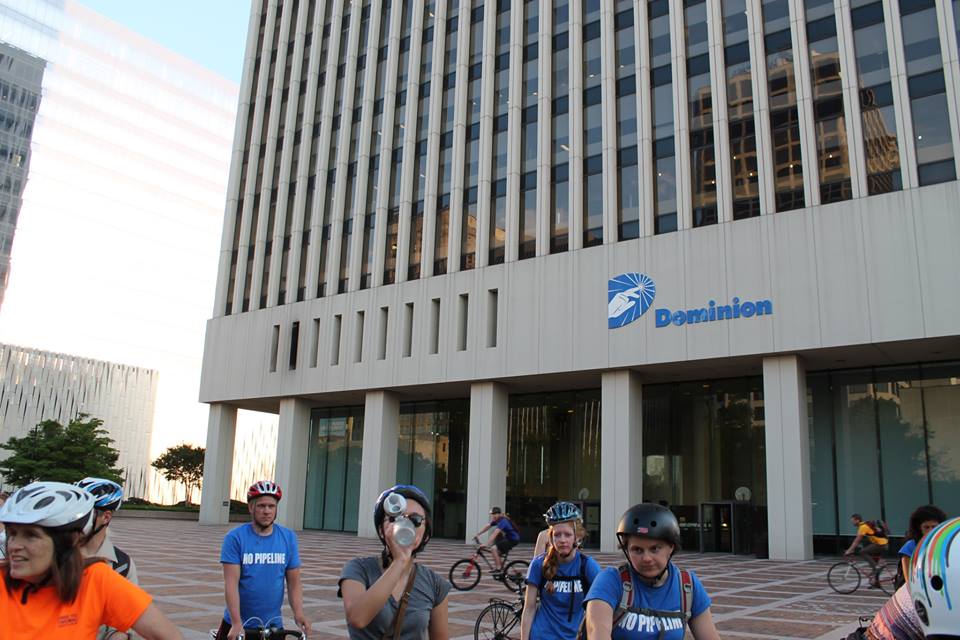
May 15th, 2015 – A “light brigade” of activists spells out a special message for Dominion, as a packed crowd below enjoys one of Riverrock’s nighttime concerts.


May 16, 2015 – Anti-pipeline activists go into the crowds at Dominion’s Riverrock to give out information, petition and take over Dominion’s event hashtag #SeenAtRiverRock.

In the lead up to all of this grassroots action, CCAN and anti-pipeline allies united to deliver 5,000 petitions to Governor Terry McAuliffe urging him to rescind his support of the pipeline. CCAN activists also submitted over 500 public comments to the Federal Energy Regulatory Commission in April. Through the comments, we urged federal regulators to conduct a thorough environmental review that considers the full climate-disrupting impact of the fracked gas the Atlantic Coast Pipeline would carry — as well as the environmental benefits of NOT building it at all.
With Virginia climate activists, pipeline fighters, and the media alike shedding increasing light on Dominion’s dirty energy pollution, this summer will be the perfect time to keep turning up the heat — with your help!
Next Actions
July 2nd – CCAN sponsors a screening of Won’t Pipe Down, a short film telling the story of the people and places caught in the path of the Atlantic Coast Pipeline, on July 2nd in Richmond, Virginia. The viewing is followed by a panel with a group of grassroots organizers fighting the pipeline. Join us Thursday July 2nd at 7pm for an active movie night!
July 18th – Pipeline fighter groups Friends of Nelson County and Friends of Augusta are coming together to host a music event on Saturday, July 18th in Nelson County. Join neighbors from across the Commonwealth to enjoy “Music for the Mountains,” a festival raising funds to fight the Atlantic Coast Pipeline. Join us Saturday July 18th at 3pm for a fun grassroots event!
Learn More
Visit domtruth.org to learn the full truth about Dominion’s dirty energy investments.
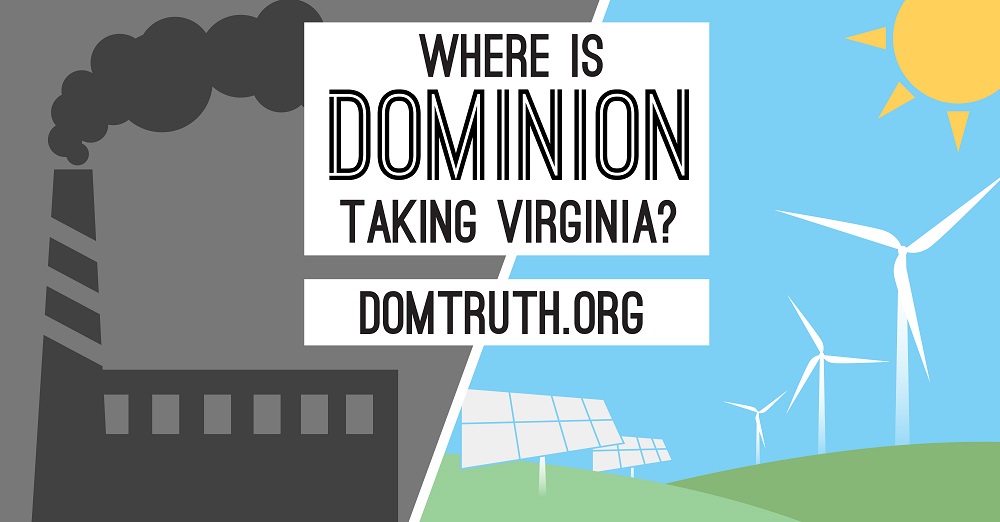
Welcome CCAN Summer Fellows!
Every summer, CCAN hires talented and passionate young people from across the region to join us as Fellows and interns. This summer, our Fellows and interns will be spreading out across the region to protect Virginia’s coast from rising seas, bring more clean energy to Maryland, stop dirty energy projects like fracking in Western Maryland and pipelines in central and southwest Virginia, and draw attention to the growing threat of bomb trains rolling through our cities and towns. Ultimately, they’ll be building the people-powered movement it’s going to take to bring the fossil fuel industry to its knees and tackle one of the most important issues of our time.
Thank you, in advance, to our Summer 2015 Fellows for all of the great work you’re going to do this summer!
And if you cross paths with one of our hard working fellows this summer, please join us in welcoming them to the CCAN team!
Introducing…CCAN’s Summer 2015 Fellows:
Beatrice Ohene-Okae – Safe Coast Fellow, Richmond, VA
 Beatrice is from Alexandria, Virginia, and is currently a junior at the University of Mary Washington majoring in Environmental Science. She is a student organizer with the Virginia Student Environmental Coalition and the Virginia Student Power Network. On her campus, she is involved in DivestUMW and UMW Students United, which focus on promoting sustainability and transparency as well as social and economic responsibility. Her passions include eating strawberries, learning more about sustainability issues around the world, and trying to play her violin.
Beatrice is from Alexandria, Virginia, and is currently a junior at the University of Mary Washington majoring in Environmental Science. She is a student organizer with the Virginia Student Environmental Coalition and the Virginia Student Power Network. On her campus, she is involved in DivestUMW and UMW Students United, which focus on promoting sustainability and transparency as well as social and economic responsibility. Her passions include eating strawberries, learning more about sustainability issues around the world, and trying to play her violin.
Kendall King – Safe Coast Fellow, Richmond, VA

Kendall is a rising second year at the University of Virginia. She’s originally from the east coast, but her parents currently live in Tulsa, Oklahoma and she attended high school there. She serves as media liaison for the Virginia Student Environmental Coalition, as well as Outreach Coordinator for the Climate Action Society at the University of Virginia.
Nqobile Mthethwa – Atlantic Coast Pipeline Fellow, Charlottesville and Richmond, VA
 Nqobile is a 3rd year at the University of Virginia, studying Political Science with a concentration on Foreign Affairs with a minor in Global Sustainability. She’s the political engagement coordinator of Virginia Student Environmental Coalition and a member of UVA Climate Action Society. She attended several energy and clean power plan hearings for the VA Energy Plan while interning with Appalachian Voices in 2014 and worked with Organizing for Action’s Climate Change team on Clean Power Plan and solar initiatives. Recently, she’s been working on the Atlantic Coast Pipeline resistance effort, organizing against natural gas infrastructure. She’s really interested in policy pertaining to energy in Virginia and how to build student political power to steer universities and the state towards a fossil free future.
Nqobile is a 3rd year at the University of Virginia, studying Political Science with a concentration on Foreign Affairs with a minor in Global Sustainability. She’s the political engagement coordinator of Virginia Student Environmental Coalition and a member of UVA Climate Action Society. She attended several energy and clean power plan hearings for the VA Energy Plan while interning with Appalachian Voices in 2014 and worked with Organizing for Action’s Climate Change team on Clean Power Plan and solar initiatives. Recently, she’s been working on the Atlantic Coast Pipeline resistance effort, organizing against natural gas infrastructure. She’s really interested in policy pertaining to energy in Virginia and how to build student political power to steer universities and the state towards a fossil free future.
Millie Smith – Mountain Valley Pipeline Fellow, Richmond, VA
 Millie just finished her sophomore year at Virginia Tech. She is in an interdisciplinary environmental studies program, with a concentrations on civic agriculture and urban planning. Based in Blacksburg, she has worked most with building community power and opposition to the Mountain Valley Pipeline.
Millie just finished her sophomore year at Virginia Tech. She is in an interdisciplinary environmental studies program, with a concentrations on civic agriculture and urban planning. Based in Blacksburg, she has worked most with building community power and opposition to the Mountain Valley Pipeline.
Nate Levine – Hampton Roads Organizing Fellow, Norfolk, VA
 Nate is a native of Virginia Beach, and it’s his love of surfing and the ocean sparked an urgency to fight climate change. He is currently pursuing a B.A. in English: Creative Writing and a B.A. in History at the University of Mary Washington. At Mary Washington, he directed his passion for environmental justice into organizing with the DivestUMW campaign, which is pressuring the administration and Board of Visitors to withdraw their investments from the fossil fuel industry. In his spare time, Nate enjoys surfing, hiking, writing poetry, and playing guitar.
Nate is a native of Virginia Beach, and it’s his love of surfing and the ocean sparked an urgency to fight climate change. He is currently pursuing a B.A. in English: Creative Writing and a B.A. in History at the University of Mary Washington. At Mary Washington, he directed his passion for environmental justice into organizing with the DivestUMW campaign, which is pressuring the administration and Board of Visitors to withdraw their investments from the fossil fuel industry. In his spare time, Nate enjoys surfing, hiking, writing poetry, and playing guitar.
Alex Krass – Bonner Center for Civic Engagement Fellow, Richmond, VA
 Alex Krass is a rising senior at the University of Richmond, majoring in Environmental Studies and Business. He started working on the divestment movement on Richmond’s campus. Originally from Vermont, he has lived there most of his life, giving him a true appreciation for the outdoors. Alex’s fellowship exists through a partnership with the University of Richmond’s Bonner Center for Civic Engagement.
Alex Krass is a rising senior at the University of Richmond, majoring in Environmental Studies and Business. He started working on the divestment movement on Richmond’s campus. Originally from Vermont, he has lived there most of his life, giving him a true appreciation for the outdoors. Alex’s fellowship exists through a partnership with the University of Richmond’s Bonner Center for Civic Engagement.
Jamie DeMarco – Clean Energy Fellow, Takoma Park, MD
 Jamie grew up in Baltimore and is currently a Chemistry and Environmental Studies double major at Warren Wilson College. He enjoys running, climbing and acting, but has recently come to enjoy activism more and more. This past year, he was involved in campaigns to reform smoking policies on his college campus, and volunteered as a sexual assault crisis responder. He also tied himself to the White House fence and lobbied Senators to combat climate change.
Jamie grew up in Baltimore and is currently a Chemistry and Environmental Studies double major at Warren Wilson College. He enjoys running, climbing and acting, but has recently come to enjoy activism more and more. This past year, he was involved in campaigns to reform smoking policies on his college campus, and volunteered as a sexual assault crisis responder. He also tied himself to the White House fence and lobbied Senators to combat climate change.
Kiernan Colby – Healthy Communities Fellow, Takoma Park, MD
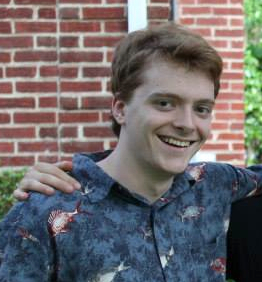 Kiernan is a senior Community and Justice Studies and Religious Studies major at Guilford College in Greensboro, North Carolina. Originally from Silver Spring, MD, Kiernan is a Quaker, musician and activist committed to fighting for the restoration of the Earth. When not organizing for social justice, Kiernan bikes, reads and plays guitar in a funk band. This summer, Kiernan will be working with CCAN and Forest Ethics as the regional coordinator for an international “Stop Oil Trains Week of Action.”
Kiernan is a senior Community and Justice Studies and Religious Studies major at Guilford College in Greensboro, North Carolina. Originally from Silver Spring, MD, Kiernan is a Quaker, musician and activist committed to fighting for the restoration of the Earth. When not organizing for social justice, Kiernan bikes, reads and plays guitar in a funk band. This summer, Kiernan will be working with CCAN and Forest Ethics as the regional coordinator for an international “Stop Oil Trains Week of Action.”
Sarah Snead – Don’t Frack Maryland Fellow, Takoma Park, MD
 Sarah is a rising senior at American University, majoring in Environmental Studies and minoring in Economics. She is from Westminster, Maryland originally. For the past 3 years she’s helped organize on her campus with Fossil Free AU. In her free time she plays on the women’s ultimate Frisbee team.
Sarah is a rising senior at American University, majoring in Environmental Studies and minoring in Economics. She is from Westminster, Maryland originally. For the past 3 years she’s helped organize on her campus with Fossil Free AU. In her free time she plays on the women’s ultimate Frisbee team.
Lauren Chartuk – Communications Fellow, Takoma Park, MD
 Lauren is a sophomore at Virginia Commonwealth University, majoring in English. Lauren is the Senior Secretary for Poictesme, VCU’s literary journal. She is also part of the Virginia Student Environmental Coalition, working with the media team and holding a seat in VSEC’s council. When she isn’t working with VSEC or Poictesme she’s in a hammock reading, or practicing her French in preparation for COP21 in Paris. Sauvons l’environnement!
Lauren is a sophomore at Virginia Commonwealth University, majoring in English. Lauren is the Senior Secretary for Poictesme, VCU’s literary journal. She is also part of the Virginia Student Environmental Coalition, working with the media team and holding a seat in VSEC’s council. When she isn’t working with VSEC or Poictesme she’s in a hammock reading, or practicing her French in preparation for COP21 in Paris. Sauvons l’environnement!
CCAN will also be joined this summer by two Takoma Park based Special Projects Interns – Derek Burtraw and Robin Rice.
 Derek is a senior at Ursinus College in Collegeville, Pennsylvania, working on a double major with Environmental Studies and Music.
Derek is a senior at Ursinus College in Collegeville, Pennsylvania, working on a double major with Environmental Studies and Music.
 Robin Rice is a rising sophomore at the University of Vermont.
Robin Rice is a rising sophomore at the University of Vermont.
Again, WELCOME to CCAN’s Summer 2015 Fellows and interns. We’re so excited to be working with you!
For Dominion there’s no hiding from the public
Photo Credit: Corrina Beall, Virginia Sierra Club
Last week over 150 protesters descended on Dominion Resources’ annual shareholder meeting in Glen Allen, VA. They came from all over—as far as Augusta County, Norfolk, and Cove Point, MD—to stand united against Dominion’s dirty energy investments.
For shareholders and executives attending the meeting, there was no hiding from droves of protesters lining both sides of the entranceway with their banners and a ‘mock’ inflatable pipeline.
What motivated so many activists to trek several hours for a protest on a Wednesday morning at 8am? For those who traveled from Augusta, Nelson, and Buckingham counties it’s their vehement opposition to Dominion’s proposed Atlantic Coast Pipeline (ACP), which would be constructed through their farms, businesses, and homes to serve as a conduit for ’fracked’ gas from West Virginia. Increasingly, Virginia landowners are fighting in solidarity with West Virginians opposing ‘fracking’ in their own backyards. If Dominion gets its way with the ACP, there’s little doubt that even more ‘fracked’ wells will be constructed in West Virginia to meet the growing pipeline capacity, threatening groundwater and releasing potent greenhouse gases into our atmosphere. With Virginia’s coast 2nd only to New Orleans as the most vulnerable area in country to sea level rise, it’s unacceptable for Dominion to be accelerating projects that contribute to climate change.
Pipeline opponents were not the only protestors in the crowd. Vans brought in dozens more from Northern Virginia and Hampton Roads and one group came from Lusby, MD, the site of Dominion’s proposed Cove Point export facility—another one of Dominion’s multi-billion dollar investments in ‘fracking’ infrastructure.
The huge turnout is an indicator of growing citizen backlash against the company’s dirty energy investments and dirty politics. This is becoming evident as articles and editorials in the press are frequently calling attention to Dominion’s “unrivaled power” in Virginia Politics, especially in the wake of the company’s successful efforts to partially halt the state’s oversight of its electric rates by passing favorable legislation in the 2015 General Assembly.
Opposition to Dominion’s dirty energy projects was not just limited to outside of the shareholder meeting. Even though non-shareholders were unable join the meeting, activist shareholders brought the public’s frustration to the forefront of the discussion. Six of the eight shareholder resolutions presented to the room demanded that the company take action on climate change or improve its environmental policies. Several of the resolutions received support in excess of 20%, and all but one received more support than last year, signaling a growing demand amongst investors that urgent action is needed on climate change. Later in the meeting shareholders had another opportunity to raise their concerns by asking questions directly to CEO Tom Farrell. Over a dozen people got up to ask questions and, except for one person, all of the questions were framed around Dominion’s dirty energy projects, climate change, or in one particular case, Dominion’s membership to the infamous American Legislative Exchange Council (ALEC).
This year’s annual shareholder meeting was not a walk in the park for Dominion Resources. Opposition from inside and out is chipping away at Dominion’s carefully orchestrated public image. With the public and the media increasingly skeptical, the time is right to continue pressuring Dominion to halt building massive fracked gas infrastructure and to reexamine its energy portfolio, which is currently at odds with our climate.
Does your vision of Calvert County include Dominion?
Virginia-based Dominion Resources has never been the first thing that’s come to mind when I think about Calvert County. I think about trail-running in the American Chestnut Land Trust, or fossil-hunting as a kid at Calvert Cliffs, or sharing stories with friends in Solomons. To me, Calvert County is famous for its friendly communities, fresh air and natural beauty.
Yet, for the past 6 months, Dominion has been changing that. After hiring non-local construction workers, creating traffic jams and clearing forests, they are continuing to build their massive Cove Point export facility to process and ship billions of gallons of fracked gas from the Marcellus Shale overseas.
As CCAN gears up its legal battle to challenge the Federal Energy Regulatory Commission’s approval of Cove Point, a relentless and growing group of community members from across Southern Maryland continue to organize: holding meetings, presenting at weekly Board of Calvert County Commissioners’ meetings, knocking on neighbors’ doors, and pushing against a behemoth company to protect their neighborhoods. And it’s all leading up to an exciting rally, march, and comm unity picnic on May 30th — The March for Calvert County to be Dominion-Free!
unity picnic on May 30th — The March for Calvert County to be Dominion-Free!
The day will begin with an inspiring rally at the Solomons boardwalk at 9AM. Following that, you can “join the flock” for a six-mile walk through Lusby ending at Cove Point Park, where we will celebrate everything we love about Calvert County. Join friends and community members for a family picnic and fellowship at 1PM.
Click here to join us at the March for Calvert County to be Dominion-free. On May 30th, we will show Calvert County that Dominion’s dirty fracked gas facility is not a done deal.
Since construction started, Dominion has failed the community, and now, it’s time to speak up. Show Calvert County and beyond that your vision of Calvert county is Dominion-Free. Let them know, we want our communities to be healthy and thriving, not polluted with more fracking wells or pipelines just so this corporation can make bigger profits.
Here are the details:
WHAT: March for Calvert County to be Dominion-free
WHEN: May 30th, 2015
WHERE: 9AM – Rally at Solmons Boardwalk in Solomons, MD
9:30AM – March! 6 miles from Solomons through Lusby
1PM – Picnic and Fellowship at Cove Point Park
750 Cove Point Rd, Lusby, MD 20657
See you May 30th at the March for Calvert County to be Dominion-free!
FERC Meetings in Virginia Demonstrate Widespread Opposition to Proposed Pipeline
Last week, the Federal Energy Regulatory Commission (FERC) held two public scoping meetings in Virginia to hear comments on the proposed Mountain Valley Pipeline project, a 300-mile interstate pipeline proposed to run from northern West Virginia to southern Virginia. These meetings, intended to gather input on the issues FERC must address in its environmental review, are the only two public meetings currently planned by FERC in Virginia. Two meetings have been held in West Virginia already and two additional meetings will happen in West Virginia this week. The pipeline would cost $3.2 billion dollars and transport two billion cubic feet per day of fracked gas extracted from the Marcellus and Utica shale formations.
The first meeting was held Tuesday night in Elliston, Virginia. A large crowd of nearly 400 people turned out. Before the meeting began, organizers from The Blue Ridge Environmental Defense League and Preserve Floyd joined local residents to sing songs and chants in opposition to the project. Unfortunately, while over 100 people signed up to comment at the meeting, only around 70 people were able to testify before the meeting was scheduled to end. On Thursday, residents gathered in Chatham, Virginia with an equally strong message of opposition to the project. About 100 people attended the Chatham meeting and a majority of the speakers expressed their opposition to the plans. Before the meeting, a group of opponents organized by The Blue Ridge Environmental Defense League and Preserve Franklin gathered to call for a “community veto” of the project.
Commenters shared their concerns about the environmental threats of the project specific to their properties, as well as their concern that the project would not provide sufficient public benefits to merit seizing land through use of eminent domain law. Additionally, commenters raised the concern that the company behind the proposed pipeline, Mountain Valley Pipeline LLC, has not released specifics on the proposed compressor stations for the project, that could be sited in either Montgomery or Roanoke Counties. This is problematic because people who could be living near the compressor stations, which are known to emit toxic pollution and come with significant safety dangers, will not get the opportunity to share their concerns with FERC at a public meeting.
Now that the two Virginia scoping meetings are over, we’re encouraging opponents of this pipeline project to share their concerns with FERC in writing. The comment period for the Mountain Valley Pipeline ends on June 16th. You can submit a written comment to FERC about the project here.
The Mountain Valley pipeline is one of three new fracked-gas pipelines the fossil fuel industry is pushing in Virginia. The Atlantic Coast Pipeline, a Dominion project, faces strong opposition to proposed construction, as well. Currently, Virginia Student Environmental Coalition students, along with CCAN organizer Drew Gallagher are biking the route of the proposed Atlantic Coast Pipeline in protest.
You can also join Beyond Extreme Energy for a protest at FERC Headquarters in Washington D.C. on May 27th for the Pipeline Opposition Day that’s part of Stop the FERCUS! and the May 14th mass nonviolent protest event, also happening at FERC headquarters during FERC’s May commissioner’s meeting.
Contact me for more information and to get involved! Lauren@chesapeakeclimate.org.
A busy spring for Virginia students
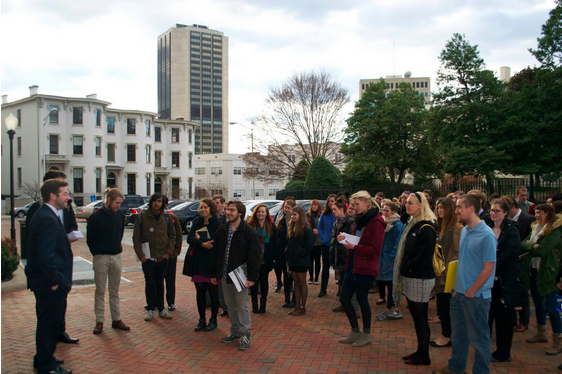
As the semester winds down and finals week ominously approaches, you might see a slight lull in Virginia student activism. Trust me, it won’t last long. But while students are studying, I thought I would recap the semester with some of the incredible highlights pulled off since January by the Virginia Student Environmental Coalition.
Students roared out of the gate in 2015, putting on the annual January VSEC Convergence before the semester even started. Sixty-five students from around the state came down to Richmond, Virginia for a weekend full of trainings on lobbying and Virginia policy. On MLK Day, they marched to meet Virginia’s Deputy Secretary of Natural Resources Evan Feinman, where they delivered 178 hand written letters opposing the Atlantic Coast Pipeline. Following the march, they descended upon the Virginia General Assembly, where they met and lobbied thirteen state delegates and senators on the Virginia Coastal Protection Act.

Three weeks after flexing their political muscles at the Capitol, VSEC was at it again in Fredericksburg at the University of Mary Washington putting on Virginia Power Shift 2015. This time more than 350 students gathered from across the state to discuss building student power, the intersectionality of our movements, and how we can make serious change in Virginia.
The first Virginia Power Shift in 2014 had 125 attendees, and ten short months later Virginia Power Shift 2015 almost tripled that number. A true testament to the growth of student activism in Virginia.
You’d think after Power Shift things would have cooled off for a bit. Wrong. Recharged and reinvigorated, dozens of VSEC students spent their spring breaks’ in the mountains of south west Virginia at Mountain Justice Spring Break. MJSB is a week long action camp centered around combating mountain top removal mining and fracking in Appalachia.

In late March, students at the University of Mary Washington began a 20 day sit-in of their President’s office demanding a subcommittee be formed to study the prospect of divestment. The sit-in ran peacefully for almost three weeks until the administration had state troopers remove students from their occupation, arresting two. The arrests sparked a flurry of action across the state and amplified the energy surrounding divestment in Virginia. There have been at least 5 divestment campaigns launched within the past month capitalizing on the recent momentum.
The Divest UMW sit-in fell within a larger wave of student divestment sit-ins that swept the nation, happening at schools such as Harvard, Yale, Tulane, Colorado University, Swarthmore and Wesleyan. Divest UMW students helped lead the way and provided experience and support to other schools beginning their sit-in.

Virginia students prefer to end on a bang, not a whimper. In two weeks you will find them closing out the semester with a group of more than thirty students riding their bikes across Virginia.They’ll be following the route of the proposed Atlantic Coast Pipeline to help reinforce local resistance and grow the opposition. The ride will take 10 days and will take students from the mountains of Highland County to the coast of Virginia Beach. Each night students will meet with community members and learn their stories. The ride is used as a tool to draw attention to these stories and raise awareness of the dangers of this proposed pipeline.
The Virginia Student Environmental Coalition has had an inspiring semester of action, growth, and new possibilities. New alliances and friendships were formed. Power was built. And the horizons were broadened. The students of Virginia are ready to carry their success forward and change the course of Virginia for the better.


